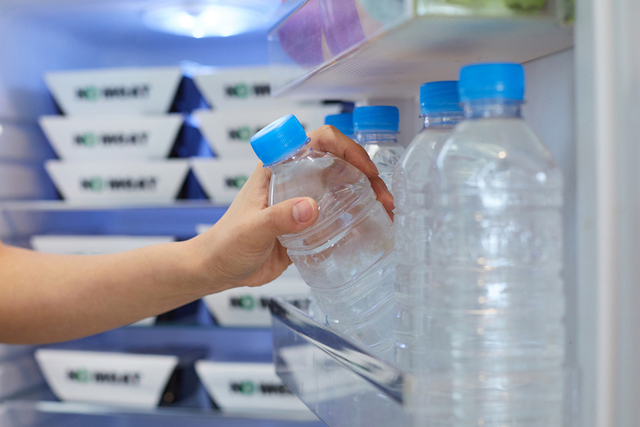물도 먹는 방법이 다양하더라요 찬물은 배탈 날수 있으니까 미지근한 물을 선호해서 먹어요
Minum banyak air dingin bisa berbahaya bagi kesehatan... Bagaimana cara minum air saat cuaca panas (berbagi artikel)
Aduh, semakin hari cuaca semakin panas, anak-anak terus mencari air dingin.
Agar sebaiknya minum air hangat-hangat kuku,
Mereka juga disarankan untuk mencampur air hangat, tetapi karena panas, mereka berusaha mengambilnya dari lemari es dan meminumnya.
Memang.. saya juga di kantor kalau panas, minum air dari mesin penyaring air yang dingin..
Lihat lagi artikel ini, dan lebih baik menggunakan air hangat daripada air dingin
Saya juga harus berusaha dan memberi tahu anak-anak.
-----------------------------------------------------------------------------
Karena cuaca yang semakin panas akhir-akhir ini, banyak orang mencari air es atau air dingin. Namun, diketahui bahwa air dingin dapat menurunkan suhu tubuh dan menyebabkan penurunan daya tahan tubuh, yang tidak baik untuk kesehatan. Apakah benar bahwa minum banyak air dingin saat cuaca panas seperti sekarang bisa berbahaya bagi kesehatan?
Air dingin, menurunkan suhu perut dan mengurangi fungsi pencernaan
Pasien dengan penyakit jantung dan pembuluh darah otak serta hipertensi harus lebih berhati-hati

Singkatnya, minum banyak air dingin saat merasa panas atau haus tidak baik untuk kesehatan lambung. Enzim pencernaan di lambung kita bekerja paling aktif pada suhu 35∼40℃, dan air dingin dapat menurunkan suhu lambung sehingga memperlambat proses pencernaan.
Selain itu, menghangatkan air hingga suhu perut biasanya juga memakan energi, sehingga energi yang dibutuhkan untuk pencernaan dapat berkurang, yang juga bisa menjadi masalah.
Profesor Shin Woo-young dari Departemen Kedokteran Keluarga di Rumah Sakit Universitas Chung-Ang Gwangmyeong menjelaskan, "Air hangat suam-suam kuku lebih mudah diserap oleh tubuh karena suhu tubuh dan dapat mengurangi beban pada saluran pencernaan atau sistem tubuh lainnya," dan menambahkan, "(dibandingkan air dingin) air hangat suam-suam kuku dapat memfasilitasi aktivitas enzim pencernaan dan aliran darah, sehingga lebih baik untuk kesehatan."
Minum air dingin secara tiba-tiba dapat merangsang sistem saraf otonom secara berlebihan, menyebabkan penyempitan pembuluh darah dan berpotensi menyebabkan gangguan irama jantung serta penyakit jantung lainnya, yang juga berdampak buruk bagi kesehatan pembuluh darah. Selain itu, jika suhu tubuh turun karena minum air dingin, daya tahan tubuh dapat melemah, sehingga meningkatkan risiko terhadap berbagai penyakit.
Karena itu, orang tua dengan sirkulasi darah yang tidak lancar, penderita penyakit jantung, dan penderita hipertensi harus berhati-hati dalam mengonsumsi air dingin.
Profesor 오영택 dari Departemen Gawat Darurat Rumah Sakit Universitas Chung-Ang mengatakan, "Salah satu indikator yang dapat diketahui seberapa dingin air mempengaruhi pembuluh darah adalah sakit kepala," dan menambahkan, "(Jika mengonsumsi sesuatu yang dingin) selama proses sementara pembuluh darah otak menyempit lalu kembali mengendur, sakit kepala akan muncul. Oleh karena itu, harus berhati-hati dengan air es yang menyebabkan sakit kepala."
Pada akhirnya, suhu air minum yang tepat sekitar 30℃, dan disarankan untuk membagi asupan harian yang direkomendasikan sebesar 1,5 hingga 2 liter menjadi 200 hingga 300 ml setiap kali minum. Selain itu, jika berkeringat banyak atau berolahraga dalam waktu lama, disarankan untuk minum minuman berion agar dapat mengisi kembali cairan dan elektrolit.
Profesor Oh Young-taek menekankan bahwa "jika produksi keringat berlebihan dan hanya mengisi cairan dengan air, garam akan menjadi lebih encer sehingga dapat menyebabkan mual, sakit kepala, kejang otot, kejang seluruh tubuh, dan penurunan kesadaran, sehingga perlu berhati-hati," dan "minuman ber-ion memiliki elektrolit dalam jumlah yang cukup sehingga dapat mencegah efek samping tersebut."